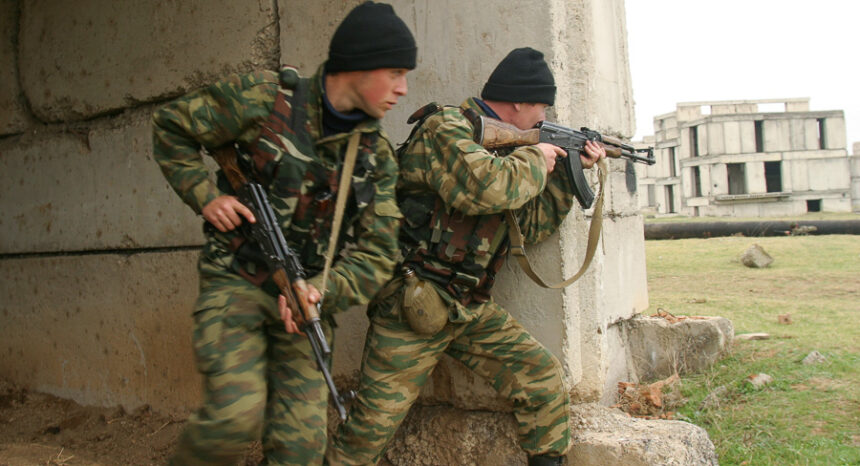The American military trains officers from around the world. Back at home, they are nearly twice as likely to attempt a coup than officers who do not receive U.S. training.
The issue: With evident pride, Capt. Amadou Sanogo of Mali described his American military training to Time magazine. He had studied English in Texas, intelligence in Arizona, infantry tactics in Georgia, and wore a Marine Corps pin to mark his training at Quantico, in Virginia. It was 2012 and Sanogo had just overthrown the government in his native country in West Africa.
The United States spends hundreds of millions of aid dollars a year training foreign officers like Sanogo. Champions of such programs argue that they instill respect for human rights while forging American allies. But some trained officers have gone home to attempt a coup d’état or commit human rights abuses. Human Rights Watch alleges that Sanogo’s soldiers dumped opponents in mass graves and intimidated journalists. In Honduras, a 2009 coup was reportedly led by American-trained officers. And Egyptian strongman Abdel Fattah al-Sisi, who ousted his country’s democratically elected government in 2013, spent a year at the United States Army War College, in Pennsylvania, where he wrote a thesis on democracy.
Other examples span the decades. Are these officers outliers?
An academic study worth reading: “When Human Capital Threatens the Capitol: Foreign Aid in the Form of Military Training and Coups,” in the Journal of Peace Research, 2017.
Study summary: Jesse Dillon Savage of Trinity College Dublin and Jonathan Caverley of the U.S. Naval War College in Rhode Island look for a relationship between American military training and coups around the world.
Using Defense Department data, they focus on the International Military Education and Training program (IMET), which is designed to increase the receiving military’s human capital as well as its respect for civilian government. Thousands of officers from developing countries have passed through IMET over the decades. Their countries are often poor and corrupt — countries that previous research has shown are more susceptible to coup attempts.
Savage and Caverley compare this data with lists of successful and attempted coups led by military officers (89 percent of coups over this period were).
The researchers focus on military training aid, which is given to countries for free, not trainings that are paid by foreign governments. To eliminate concerns about confounding variables, they test their findings on IMET against other types of aid data: a different U.S. military aid program designed to combat terrorism and total foreign aid to a country. And because the length of IMET training can vary from a few weeks in the officer’s home country to a year in the U.S., the authors examine overall IMET spending per country.
Key findings:
- About 61 percent of coup attempts between 1970 and 2009 failed. Of those that succeeded, two-thirds were carried out by officers who participated in the IMET program. “Successful coups are strongly associated with IMET training and spending.”
- 60 percent of military-backed coups or coup attempts occurred in countries that had received IMET training the previous year.
- Countries whose officers had participated in IMET were nearly twice as likely to experience a coup or coup attempt.
- If the number of officers trained, or the amount the U.S. spends, moves from the 25th percentile to the 75th percentile, the chance of a coup or attempted coup doubles.
- U.S. military aid (weapons, for example, but not including training) has a slightly negative relationship to coup probability, supporting the hypothesis that weapons enable regimes to protect themselves, or, as the authors call it, “coup-proof” themselves.
- Other foreign aid (food, for example) has no statistical relationship to coup probability.
- IMET is a subset of American foreign military training. In fiscal year 2015, the U.S. spent a total of $876.5 million to train over 76,000 foreign soldiers from 154 countries; about $300 million of that was aid.
- The authors conclude, “Training imparts valuable resources to and increases the professional distance of a potentially dangerous section of a developing state’s polity [the military]. Increasing trainees’ human capital is likely to increase resource demands on the regime, and improve the military’s ability to remove the regime should its demands not be met.”
Helpful resources:
Savage and Caverley calculate the total amount spent on military training aid by subtracting two numbers published by the State Department and Pentagon in their annual Joint Report to Congress. The report for fiscal years 2015 and 2016 is here.
Spending on the IMET program from 2009 to 2017, by country, is available here in the State Department’s archives.
The Stockholm International Peace Research Institute (SIPRI) is often cited by scholars and journalists looking for independently collected data on the world’s militaries.
The Security Assistance Monitor at the Center for International Policy enables researchers to dig into American military spending.
Other research:
This 2016 paper in the Journal of Applied Econometrics finds a strong relationship between American food aid to countries suffering civil conflicts and longer conflicts.
Since the end of the Cold War, the number of coups that have been followed by democratic elections has risen, this 2014 paper in the British Journal of Political Science demonstrates.
Journalist’s Resource has looked at foreign aid shocks and their role in instability, the impact of terrorism on investment, the costs of the wars in Afghanistan and Iraq, and the militarization of American police forces.


Expert Commentary